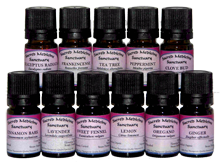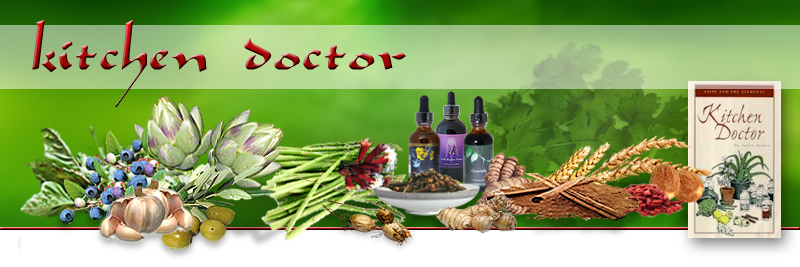 |
Essential Oils |
Sacred Medicine Sanctuary carries a wide range
of therapeutic grade essential oils, all produced by known distillers.
All plant material is from organically grown or wildcrafted sources.
We respect the need for sustainable agricultural practices and
support the farmers and distillers who share our environmental
ethics.

At this time, we have all of the following in
5 ml. bottles and some in 30 ml. bottles:
Basil, Costa Rica, is similar to tulsi
from India where it is used to improve concentration and relieve
congestion in the head. It
is anti-infectious and often the first choice for migraines or
where there is neuropathy or arthritis as well as paralytic conditions.
It is used to fight intestinal parasites and to stimulate the
liver and pancreas. It combines exceptionally well with eucalyptus
or lavender essential oil.
Cinnamon Bark, Sri Lanka, is often used
as a bactericide or for lowering blood sugar. It is also
antifungal and antimicrobial. It is irritating and should
not be used on skin; however, it can be used to purify air and
reduce risks from airborne pathogens. It can also be used
as a flavoring or to relieve abdominal bloating and flatulence.
It combines exceptionally well with orange essential oil.
Clove Bud, Madagascar, is most commonly
used for tooth aches but is very antimicrobial and antifungal. It
is an excellent respiratory and cardiovascular aid. There is some
research suggesting it normalizes thyroid function. If diluted
(1% essential oil), clove oil can be used on the skin for acne,
warts, scars, and parasites. It blends well with basil and cinnamon
as well as lavender.
Eucalyptus, Australia, is generally used
as an inhalant for long-term sinus and respiratory complaints.
Our species, radiata, is gentler than many forms of eucalyptus
and therefore is suitable people who have spasms and other irritations. It
can be used as an antimicrobial for both bacteria and viral infections. It
combines well with lemon but also can be used with peppermint and
lavender.
Fennel, Italy, has a hint of a licorice
taste and aroma and is very popular in India and parts of Europe. It's
delicately aromatic and relaxing. It is used to detoxify
and strengthen the liver, relieve colic and spasms, promote healthy
digestion and assimilation of nutrients, and cleanse the mouth
after eating. Some believe it promotes hormonal balance.
The oil is made from the seeds and is non-toxic and non-irritating.
Frankincense, Boswellia frereana,
Oman, is mainly used to reduce inflammation, but it can also be
applied to scars. It is considered to be so spiritually elevating
that it relieves depression. It improves breathing and promotes
relaxation of a soothing and harmonizing quality. Though mainly
used ritually, recent research has found significant uses in the
treatment of cancer and diseases of the reproductive system and
urinary tract. It is non-irrating and blends well with lavender
and lemon.
Ginger, Zingiber Officinale, Madagascar,
has very specific aromatherapy uses that are quite different from
culinary and other medicinal uses. For instance, ginger is
regarded as an aid to recovering memory. It is, of course,
stimulating, but it is also grounding. It is anti-inflammatory
and has pain relieving properties. Ginger blends well with
frankincense and lemon as well as peppermint and even tea tree.
Lavender, wild, France, is one of the best
known essential oils. It was added to bath water in Roman
times and is associated with both cleanliness and deeper forms
of hygiene, such as wound care, including serious abscesses. It
is antispasmodic and soothing and is believed to lower high blood
pressure and relieve headaches. It is non-toxic and non-irritating
and blends well with lemon and peppermint when taken to reduce
spasms and relax nerves.
Lemon, USA, is considered to be one of
the adaptogens. It is antifungal, insecticidal, antiseptic,
and antimicrobial. It is also a vermifuge, decongestant,
febrifuge, and vasoconstrictor. Externally, it can be used
to reduce cellulite, acne, and warts. It can be gargled for
sore throats or taken internally to promote circulation and reduce
the risks of varicose veins, phlebitis, and thrombosis. It
is a pancreatic stimulant and lowers blood sugar. It is non-toxic
and non-irritating unless used in direct sun when some individuals
may exhibit signs of phototoxicity. It combines well with
other citrus oils and lavender.
Lemongrass, organic, Haiti, is often used
for skin toning and to balance the central nervous system, but
studies suggest it is one of the better antifungal oils. It
can be used for athlete's foot and makes a good insect repellent.
It is also used to relieve symptoms of jet lag. Tiny amounts
can be taken internally to stimulate digestion and relieve flatulence.
It combines exceptionally well with lemon or tea tree essential
oil.
Nutmeg, Indonesia, has a reputation for being an aphrodisiac but it is also larvacidal and antiparasitic. It is carminative and aids digestion as well as elimination. Because Nostradamus used nutmeg to induce trance, nutmeg has often been used as a mental tonic and aid to altered states of consciousness. Nutmeg combines well with other oils from spices, like cloves and ginger, as well as other mental oils like rosemary.
Oregano, wild, Turkey, is one of the truly
important essential oils. It is an excellent parasiticide
and anti-infective. It supports immunity in the face of a
host of microbes and toxins. It is very potent and is nearly
always used diluted, particularly when applied externally. It
should not be used during pregnancy. It can be blended with
other essential oils or herbal extracts. Try it with lemon
or tea tree.
Peppermint, USA, is another famous essential
oil. It is a neurotonic and chologogue with signficant antimicrobial
action. It is antibacterial and antiviral as well as antifungal. It
is useful in cases of gingivitis, toothache, nausea, liver congestion,
and irritable bowel syndrome. It enhances immunity and can
even be used to reduce risks of epidemics such as cholera and yellow
fever. On the subtle level, peppermint is believed to increase
receptivity and insight and even to promote the ability to prophesize. Obviously,
there is much lore surrounding peppermint. In moderation,
peppermint is nontoxic and even safe for use during pregnancy. It
blends nicely with lemon and lime or other respiratory oils such
as eucalyptus.
Rosemary, Morocco,
is stimulating and can be used where there is drowsiness and/or sluggish elimination. It is also antifungal and is often considered for used with candida and is especially indicated where there is pulmonary congestion. Has been shown to be clinically effective against staphylococcus and streptococcus. It should not be used during pregnancy or by people suffering from epilepsy. It blends well with many other oils: basil, ginger, lavender, lemon, and peppermint.
Tea Tree, Australia, is a very powerful
antiseptic and insect repellent. It is analgesic and sedative. It
is said to aid recovery from heart attacks, but mainly it is used
on skin conditions, everything from acne and athlete's foot to
chicken pox and herpes. It is antiseptic to the urinary tract and
promotes flow of urine. It is a mood elevator and therefore
helps combat both fatigue and depression. It combines well
with cinnamon, eucalyptus, lemon, and peppermint.
Thyme, France, can be used internally or externally. It is antimicrobial, antifungal, antioxidant, and vermifugal. Thyme has been used for thousands of years as a culinary as well as medicinal herb. It is a common ingredient in mouthwashes and retards plaque formation and gingivitis. You can combine thyme with rosemary, lemon, or tea tree.
Warning: Each month, we are adding 1-2 essential
oils to our line. Our oils are suitable for very careful
internal use, usually at a dosage of a single drop per day
or every second or third day, taken in water or mixed with
a carrier oil. Do not exceed the suggested dosage.




